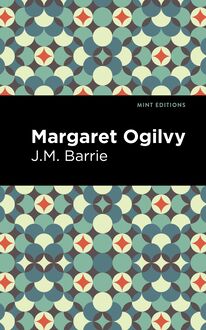-
 Univers
Univers
-
 Ebooks
Ebooks
-
 Livres audio
Livres audio
-
 Presse
Presse
-
 Podcasts
Podcasts
-
 BD
BD
-
 Documents
Documents
-
- Cours
- Révisions
- Ressources pédagogiques
- Sciences de l’éducation
- Manuels scolaires
- Langues
- Travaux de classe
- Annales de BEP
- Etudes supérieures
- Maternelle et primaire
- Fiches de lecture
- Orientation scolaire
- Méthodologie
- Corrigés de devoir
- Annales d’examens et concours
- Annales du bac
- Annales du brevet
- Rapports de stage
La lecture à portée de main
Vous pourrez modifier la taille du texte de cet ouvrage
Découvre YouScribe en t'inscrivant gratuitement
Je m'inscrisDécouvre YouScribe en t'inscrivant gratuitement
Je m'inscrisEn savoir plus
Vous pourrez modifier la taille du texte de cet ouvrage
En savoir plus

Description
Margaret Ogilvy (1897) is a biography by J. M. Barrie. Although he is more widely known as a popular storyteller whose Peter Pan books are filled with the wit and wonder of history’s greatest fairytales, Barrie was also a gifted memoirist and biographer. Margaret Ogilvy is the story of his mother and their life as a family in Scotland. Written in tribute to her influence on his life as a professional writer, Margaret Ogilvy was a bestselling book in the United States. “On the day I was born we bought six hair-bottomed chairs, and in our little house it was an event, the first great victory in a woman’s long campaign; how they had been laboured for, the pound-note and the thirty threepenny-bits they cost, what anxiety there was about the purchase, the show they made in possession of the west room, my father’s unnatural coolness when he brought them in…” From the remnants of memory, J. M. Barrie attempts to reconstruct his mother’s life. He begins with tragedy, the death of his older brother, an event which changed his mother forever. From then on, he writes, “she got her soft face and her pathetic ways and her large charity,” but before she could turn her loss into positive energy she struggled immensely with what would now be called depression. As he tries to express his gratitude for her sacrifice and support, Barrie crafts a loving portrait of the woman who gave him life. With a beautifully designed cover and professionally typeset manuscript, this edition of J. M. Barrie’s Margaret Ogilvy is a classic work of Scottish literature reimagined for modern readers.
Sujets
Informations
| Publié par | Mint Editions |
| Date de parution | 16 novembre 2021 |
| Nombre de lectures | 0 |
| EAN13 | 9781513222158 |
| Langue | English |
Informations légales : prix de location à la page 0,0300€. Cette information est donnée uniquement à titre indicatif conformément à la législation en vigueur.
Extrait
Margaret Ogilvy
J.M. Barrie
Margaret Ogilvy was first published in 1897.
This edition published by Mint Editions 2021.
ISBN 9781513222752 | E-ISBN 9781513222158
Published by Mint Editions ®
minteditionbooks.com
Publishing Director: Jennifer Newens
Design & Production: Rachel Lopez Metzger
Project Manager: Micaela Clark
Typesetting: Westchester Publishing Services
C ONTENTS I. H OW M Y M OTHER G OT H ER S OFT F ACE II. W HAT S HE HAD B EEN III. W HAT I S HOULD BE IV. A N E DITOR V. A D AY OF H ER L IFE VI. H ER M AID OF A LL W ORK VII. R. L. S. VIII. A P ANIC IN THE H OUSE IX. M Y H EROINE X. A RT T HOU A FRAID H IS P OWER S HALL F AIL ?
I
H OW M Y M OTHER G OT H ER S OFT F ACE
On the day I was born we bought six hair-bottomed chairs, and in our little house it was an event, the first great victory in a woman’s long campaign; how they had been laboured for, the pound-note and the thirty threepenny-bits they cost, what anxiety there was about the purchase, the show they made in possession of the west room, my father’s unnatural coolness when he brought them in (but his face was white)—I so often heard the tale afterwards, and shared as boy and man in so many similar triumphs, that the coming of the chairs seems to be something I remember, as if I had jumped out of bed on that first day, and run ben to see how they looked. I am sure my mother’s feet were ettling to be ben long before they could be trusted, and that the moment after she was left alone with me she was discovered barefooted in the west room, doctoring a scar (which she had been the first to detect) on one of the chairs, or sitting on them regally, or withdrawing and re-opening the door suddenly to take the six by surprise. And then, I think, a shawl was flung over her (it is strange to me to think it was not I who ran after her with the shawl), and she was escorted sternly back to bed and reminded that she had promised not to budge, to which her reply was probably that she had been gone but an instant, and the implication that therefore she had not been gone at all. Thus was one little bit of her revealed to me at once: I wonder if I took note of it. Neighbours came in to see the boy and the chairs. I wonder if she deceived me when she affected to think that there were others like us, or whether I saw through her from the first, she was so easily seen through. When she seemed to agree with them that it would be impossible to give me a college education, was I so easily taken in, or did I know already what ambitions burned behind that dear face? when they spoke of the chairs as the goal quickly reached, was I such a newcomer that her timid lips must say “They are but a beginning” before I heard the words? And when we were left together, did I laugh at the great things that were in her mind, or had she to whisper them to me first, and then did I put my arm round her and tell her that I would help? Thus it was for such a long time: it is strange to me to feel that it was not so from the beginning.
It is all guess-work for six years, and she whom I see in them is the woman who came suddenly into view when they were at an end. Her timid lips I have said, but they were not timid then, and when I knew her the timid lips had come. The soft face—they say the face was not so soft then. The shawl that was flung over her—we had not begun to hunt her with a shawl, nor to make our bodies a screen between her and the draughts, nor to creep into her room a score of times in the night to stand looking at her as she slept. We did not see her becoming little then, nor sharply turn our heads when she said wonderingly how small her arms had grown. In her happiest moments—and never was a happier woman—her mouth did not of a sudden begin to twitch, and tears to lie on the mute blue eyes in which I have read all I know and would ever care to write. For when you looked into my mother’s eyes you knew, as if He had told you, why God sent her into the world—it was to open the minds of all who looked to beautiful thoughts. And that is the beginning and end of literature. Those eyes that I cannot see until I was six years old have guided me through life, and I pray God they may remain my only earthly judge to the last. They were never more my guide than when I helped to put her to earth, not whimpering because my mother had been taken away after seventy-six glorious years of life, but exulting in her even at the grave.
S HE HAD A SON WHO was far away at school. I remember very little about him, only that he was a merry-faced boy who ran like a squirrel up a tree and shook the cherries into my lap. When he was thirteen and I was half his age the terrible news came, and I have been told the face of my mother was awful in its calmness as she set off to get between Death and her boy. We trooped with her down the brae to the wooden station, and I think I was envying her the journey in the mysterious wagons; I know we played around her, proud of our right to be there, but I do not recall it, I only speak from hearsay. Her ticket was taken, she had bidden us good-bye with that fighting face which I cannot see, and then my father came out of the telegraph-office and said huskily, “He’s gone!” Then we turned very quietly and went home again up the little brae. But I speak from hearsay no longer; I knew my mother forever now.
That is how she got her soft face and her pathetic ways and her large charity, and why other mothers ran to her when they had lost a child. “Dinna greet, poor Janet,” she would say to them; and they would answer, “Ah, Margaret, but you’re greeting yoursel.” Margaret Ogilvy had been her maiden name, and after the Scotch custom she was still Margaret Ogilvy to her old friends. Margaret Ogilvy I loved to name her. Often when I was a boy, “Margaret Ogilvy, are you there?” I would call up the stair.
She was always delicate from that hour, and for many months she was very ill. I have heard that the first thing she expressed a wish to see was the christening robe, and she looked long at it and then turned her face to the wall. That was what made me as a boy think of it always as the robe in which he was christened, but I knew later that we had all been christened in it, from the oldest of the family to the youngest, between whom stood twenty years. Hundreds of other children were christened in it also, such robes being then a rare possession, and the lending of ours among my mother’s glories. It was carried carefully from house to house, as if it were itself a child; my mother made much of it, smoothed it out, petted it, smiled to it before putting it into the arms of those to whom it was being lent; she was in our pew to see it borne magnificently (something inside it now) down the aisle to the pulpit-side, when a stir of expectancy went through the church and we kicked each other’s feet beneath the book-board but were reverent in the face; and however the child might behave, laughing brazenly or skirling to its mother’s shame, and whatever the father as he held it up might do, look doited probably and bow at the wrong time, the christening robe of long experience helped them through. And when it was brought back to her she took it in her arms as softly as if it might be asleep, and unconsciously pressed it to her breast: there was never anything in the house that spoke to her quite so eloquently as that little white robe; it was the one of her children that always remained a baby. And she had not made it herself, which was the most wonderful thing about it to me, for she seemed to have made all other things. All the clothes in the house were of her making, and you don’t know her in the least if you think they were out of the fashion; she turned them and made them new again, she beat them and made them new again, and then she coaxed them into being new again just for the last time, she let them out and took them in and put on new braid, and added a piece up the back, and thus they passed from one member of the family to another until they reached the youngest, and even when we were done with them they reappeared as something else. In the fashion! I must come back to this. Never was a woman with such an eye for it. She had no fashion-plates; she did not need them. The minister’s wife (a cloak), the banker’s daughters (the new sleeve)—they had but to pass our window once, and the scalp, so to speak, was in my mother’s hands. Observe her rushing, scissors in hand, thread in mouth, to the drawers where her daughters’ Sabbath clothes were kept. Or go to church next Sunday, and watch a certain family filing in, the boy lifting his legs high to show off his new boots, but all the others demure, especially the timid, unobservant-looking little woman in the rear of them. If you were the minister’s wife that day or the banker’s daughters you would have got a shock. But she bought the christening robe, and when I used to ask why, she would beam and look conscious, and say she wanted to be extravagant once. And she told me, still smiling, that the more a woman was given to stitching and making things for herself, the greater was her passionate desire now and again to rush to the shops and “be foolish.” The christening robe with its pathetic frills is over half a century old now, and has begun to droop a little, like a daisy whose time is past; but it is as fondly kept together as ever: I saw it in use again only the other day.
My mother lay in bed with the christening robe beside her, and I peeped in many times at the door and then went to the stair and sat on it and sobbed. I know not if it was that first day, or many days afterwards, that there came to me, my sister, the daughter my mother loved the best; yes, more I am sure even than she loved me, whose great glory she has been since I was six years old. This sister, who was then passing out of her ’teens, came to me with a very anxious face and wringing her hands, and she to
-
 Univers
Univers
-
 Ebooks
Ebooks
-
 Livres audio
Livres audio
-
 Presse
Presse
-
 Podcasts
Podcasts
-
 BD
BD
-
 Documents
Documents
-
Jeunesse
-
Littérature
-
Ressources professionnelles
-
Santé et bien-être
-
Savoirs
-
Education
-
Loisirs et hobbies
-
Art, musique et cinéma
-
Actualité et débat de société
-
Jeunesse
-
Littérature
-
Ressources professionnelles
-
Santé et bien-être
-
Savoirs
-
Education
-
Loisirs et hobbies
-
Art, musique et cinéma
-
Actualité et débat de société
-
Actualités
-
Lifestyle
-
Presse jeunesse
-
Presse professionnelle
-
Pratique
-
Presse sportive
-
Presse internationale
-
Culture & Médias
-
Action et Aventures
-
Science-fiction et Fantasy
-
Société
-
Jeunesse
-
Littérature
-
Ressources professionnelles
-
Santé et bien-être
-
Savoirs
-
Education
-
Loisirs et hobbies
-
Art, musique et cinéma
-
Actualité et débat de société
- Cours
- Révisions
- Ressources pédagogiques
- Sciences de l’éducation
- Manuels scolaires
- Langues
- Travaux de classe
- Annales de BEP
- Etudes supérieures
- Maternelle et primaire
- Fiches de lecture
- Orientation scolaire
- Méthodologie
- Corrigés de devoir
- Annales d’examens et concours
- Annales du bac
- Annales du brevet
- Rapports de stage




















